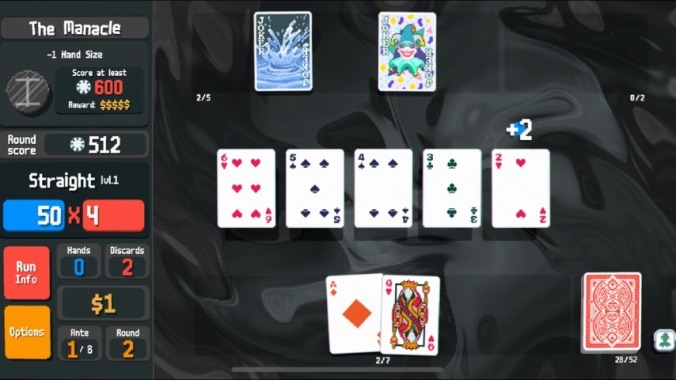Balatro Goes Mobile, Challenging Us to Remain Strong
Can we resist the sweet, sinful siren's song of this year's most dangerous game now that it's on our phone?

Get the shackles and the straps and restrain yourself tight: Balatro is now available on phones. If you’ve ever played the poker roguelike that dominated the discourse earlier this year, you know how sinfully addictive it can be, and why a mobile release calls for werewolf protocol. I spent most of February and March staying up until 3 a.m. every night playing just one more round after just one more round, getting soused on cheap rum while listening to jazz, of all things, like some wannabe beatnik bozo trapped in the clutches of technology the real beatnik bozos never could’ve fathomed. Balatro is perfect, and dangerous, and everything that makes it both great and worrisome will only be exacerbated now that it’s always in my pocket.
I’ve been playing the iOS version of Balatro for about a week now, road-testing it on a quick jaunt to California and back, and staying up too late squeezing it in as much as possible—although in my bed this time, with the lights and record player off, and no booze in sight, thankfully. It’s exactly the Balatro I was obsessed with seven months ago, only on a screen so small my aging eyes can barely tell the difference between clubs and spades. Everything seems to be here: the multiple unlockable decks, each with their own unique rules and properties; the large assortment of joker cards that alter your scoring or earning potential; the various Boss Blinds that can suddenly put a hard stop to even the most frictionless run. It’s the real deal, which means it’s an absolute must-play for anybody who can trust themselves to remain responsible and not disrupt their lives over it.
The power of Balatro lies in a common facet of videogames: the numbers go up. They have to, constantly, or else your run comes to an end, and you have to start again, immediately, as soon as possible, before you’re left alone with your thoughts again. It’s not really poker but builds upon it; you pick up to five cards from a larger hand dealt to you from your deck, with the goal of making a traditional poker hand, from a high card up to a Royal Flush. You’re not competing against any other poker hands, though, nor other players or even the computer. You earn a certain amount of chips for each card played, which is multiplied by the hand you played, and if you make a specific amount of money before you’ve played all your hands for that round you get to move on to the next round. Of course it’s not that simple; you can buy joker cards between each round, each one with its own specific benefits—they’ll multiply your score, or add additional chips, or increase how much money you earn. The goal is to build a deck that will take you through 24 rounds, at which point you “win” that run.